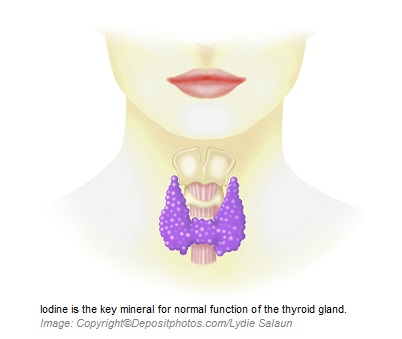Iodine is an important trace mineral needed for normal functioning of the thyroid  gland and active body metabolism. Known also as “thyroid mineral”, it is an essential nutrient for production of thyroid hormones (T4 and T3). They are required for body metabolism, energy production, normal growth and development, protein synthesis, reproduction, normal growth of skin, hair and nails, and metabolism of fat and cholesterol.
gland and active body metabolism. Known also as “thyroid mineral”, it is an essential nutrient for production of thyroid hormones (T4 and T3). They are required for body metabolism, energy production, normal growth and development, protein synthesis, reproduction, normal growth of skin, hair and nails, and metabolism of fat and cholesterol.
Food Sources and Absorption of Iodine:
Iodine rich foods are fish (especially cod and haddock), shellfish, kelp, seaweed, egg yolk, soy nuts, beans, milk, yogurt and cottage cheese. Iodized salt contains about 76 mcg of iodine per one gram of salt or 380 mcg per one teaspoon.
Dietary iodine is absorbed well from the stomach into the blood stream. Ingested iodine is bound to proteins in the blood particularly albumin. Approximately 30% of iodine enters into the thyroid gland, and the rest is excreted in the urine.
Isothiocyanates are sulfur-containing phytonutrients found in some foods. They interfere with the absorption of iodine. These foods are called “goitrogens”. Isothyocyanates are found in arugula, Bok Choy, broccoli, Brussels sprout, cabbage, cauliflower, collards, gai-lan, kale, kohlrabi, leek, mustard greens, peanuts, radish, soy beans, soy, spinach, turnip, turnip greens, and watercress.
A person has an average of 15 – 20 mg of iodine in the body with the highest concentration in the thyroid gland (about 70% – 80%). The rest is in the muscles, skin, bones, and blood.
Benefits of Iodine:

The following conditions may benefit from iodine:
- Hypothyroidism (low function thyroid).
- Goiter.
- Fibrocystic disease of breast.
- Hyperthyroidism (at very higher doses).
- Oral mucositis (inflammation of mouth due to chemotherapy or radiation therapy). Iodine mouth rinse may help reduce inflammation.
- Vaginitis (topical application).
- Wound disinfection (topical application).
- Radiation exposure.
Dosage and Side Effects:
The recommended daily allowance (RDA) for iodine in adults is 150 mcg. The RDAs for women during pregnancy and breastfeeding are 220 mcg and 290 mcg, respectively. The tolerable upper intake level for iodine in adults is 1100 mcg per day.
Iodine deficiency may manifest as goiter, low function thyroid, and cretinism (childhood hypothyroidism). Side effects of iodine occur at extremely higher doses (iodine toxicity), which manifests as thyroid dysfunction and acne – like skin eruptions.
Most people do not need supplementing with iodine, as they get enough from iodized salts. For those people in need, the usual dosage of iodine is 150 mcg per day. Iodine is a part of many multivitamins – multiminerals. It is available as potassium iodide (500 mcg per pill), kelp extract (providing 150 mcg per serving), liquid (150 mcg per one tablespoon), and oral drop 4% (250 mcg per drop). It may come in different formulations and you would need to adjust your daily intake to 150 – 300 mcg.
Interactions:
Iodine may interact with few medications:
- Anti –thyroid medications (propylthiouracil, carbimazole, and methimazole): they may lower effects of iodine.
- Lithium: it may reduce absorption of iodine.
- Sulfonamides: they reduce iodine absorption.
- Amiodarone: it may raise iodine levels dramatically.
- Spironolactone: consumption of this diuretic along with potassium iodide may increase potassium in the blood to dangerous levels.

